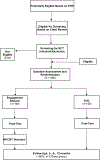Testing a new model of telehealth-delivered treatment for primary care patients with alcohol use disorder: A randomized controlled trial protocol
- PMID: 38679140
- PMCID: PMC12010255
- DOI: 10.1016/j.cct.2024.107549
Testing a new model of telehealth-delivered treatment for primary care patients with alcohol use disorder: A randomized controlled trial protocol
Abstract
Background: The majority of adults suffering from alcohol use disorders (AUD) do not receive treatment. To address this gap in care, we must develop new models to increase identification, engagement and delivery of accessible and effective treatment. This paper describes the protocol for a randomized controlled trial (RCT) testing a novel telehealth treatment model for primary care patients with untreated AUD.
Methods: We aim to recruit 300 adults across 2 healthcare systems for this two-arm RCT. Participants, initially identified for recruitment based on AUD-related indicators in their electronic health record (EHR), are RCT-eligible if they meet AUD criteria (mild, moderate, severe), report ≥ 3 drinking days/week in past 30 days, and have not received AUD psychotherapy in the past 90 days. Participants are randomized to an intervention or enhanced usual care control (EUC) condition, both individually-delivered. The intervention includes a telephone-delivered motivational interviewing (MI) engagement session and 8 sessions of MI-Cognitive Behavioral Therapy (MI-CBT). EUC involves AUD psychoeducation, advice to reduce drinking and seek treatment, and provision of community resources. Outcomes will be measured at 3-, 6-, and 12-months; primary outcomes include: AUD psychotherapy initiation and engagement (within the study and external community) and alcohol consumption (percent drinking days and heavy drinking days).
Conclusions: This study addresses whether proactive patient identification and engagement and delivery of patient-centered telehealth psychotherapy to patients with untreated AUD is effective in increasing treatment use and improving alcohol outcomes. If effective, this could be a highly scalable model for reducing the public health impact of AUD.
Trial registration: ClinicalTrials.gov # NCT05410561. University of Michigan HUM00204315. Ann Arbor VA IRB #1655886.
Keywords: Alcohol; Alcohol use disorder; Motivational interviewing; Psychotherapy; Telehealth.
Copyright © 2024 Elsevier Inc. All rights reserved.
Conflict of interest statement
Declaration of competing interest Dr. Lin has consulted on telehealth for substance use disorder treatment for National Committee for Quality Assurance with funding from Alkermes and for Providers Clinical Support System with funding from SAMHSA. The remaining authors do not have any personal financial interests related to the subject matters discussed in this manuscript.
Figures
References
-
- Centers for Disease Control and Prevention. Alcohol Related Disease Impact (ARDI) application. 2013. [cited 2018 February 5]; Available from: www.cdc.gov/ARDI.
-
- Substance Abuse and Mental Health Services Administration. National Survey on Drug Use and Health (NSDUH): 2021 NSDUH Detailed Tables. 2023. [cited 2023 04/11/2023]; Available from: https://www.samhsa.gov/data/report/2021-nsduh-detailed-tables.
-
- Maust DT, et al. , Missed opportunities: fewer service referrals after positive alcohol misuse screens in VA primary care. Psychiatr Serv, 2011. 62(3): p. 310–2. - PubMed
Publication types
MeSH terms
Associated data
Grants and funding
LinkOut - more resources
Full Text Sources
Medical
Miscellaneous


